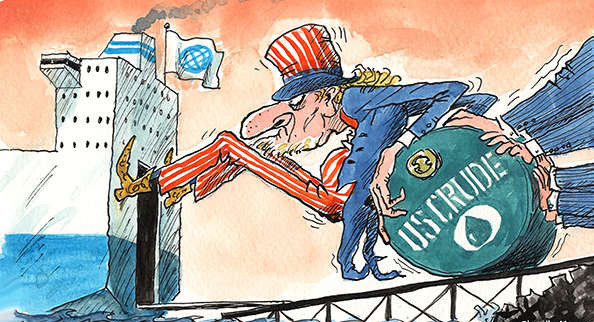John Hoeven: Four Reasons Why We Must Lift The Oil Export Ban
North Dakota Senator John Hoeven makes the case for lifting the oil export ban.

Lifting the U.S. ban on crude oil exports is a smart move that will benefit not only North Dakota, but also our nation and our allies. That’s why I am working to include legislation lifting the ban in the new highway bill that Congress is on track to pass shortly. It is must-pass legislation, which means it will be hard for the president to veto, and the benefits of allowing crude oil exports are multiple.
When taken together, they make a powerful case for allowing our producers to market their product on the world market. Doing so would enhance domestic production, increase the global supply of crude oil, grow our economy, create good-paying jobs for our people and make our nation more secure. Let’s look at the benefits one by one:
- First and foremost, crude oil exports will benefit American consumers. The price of oil is based on supply and demand — the more oil on the market, the lower the price. The volatility in the global price of crude oil is felt right down to the consumer level. More global supply means lower prices for gasoline and other fuels and more money in consumers’ pockets. Those facts are backed up by studies at both the U.S. Energy Information Administration and the nonpartisan Brookings Institute.
This spring, EIA Administrator Adam Sieminski confirmed these finding in testimony before the Energy and Natural Resources Committee, on which I serve. And in September, the EIA released a new report that reaffirms the benefits to consumers and businesses that would result from lifting the decades-old crude oil export ban.
- In addition to benefitting consumers, crude oil exports will benefit the American economy. Crude oil exports will increase revenues and boost overall economic growth. It will help increase wages, create jobs, and improve our balance of trade. The one area of our economy that currently enjoys a favorable balance of trade is agriculture. That’s because our farmers and ranchers successfully market their products around the world. Our crude oil producers can do the same.
Local economies also benefit. Service industries, retail and other businesses in communities centered on oil development would see more economic activity and growth if this antiquated ban is lifted.
- Crude oil exports will also benefit the U.S. energy industry. The EIA’s latest study concluded that lifting the ban will reduce the discount for light sweet crude oil produced in states like North Dakota and Texas and encourage investment in domestic energy production.
The drop in the price of oil this year has slowed domestic production, but we continue to produce oil. Today, North Dakota is producing about 1.19 million barrels of oil per day, only slightly down from our peak of 1.22 million. The reason is that our producers are resilient and innovative; they are developing new technologies and techniques to become more cost-effective and efficient all the time — the American energy renaissance is here to stay.
The energy sector, moreover, provides high paying jobs for our people. We know that from experience in North Dakota, which has had the fastest growing rate of per capita personal income in the country in recent years.
On a national level, crude oil exports will help to bring our energy policy into the 21st century. The crude oil export ban is an economic strategy implemented in the 1970s, and the world has changed dramatically since then. Back then, the conventional wisdom was that there is a finite quantity of oil in the world, and we pretty much knew where it was. Nobody envisioned the kind of energy revolution we’re seeing in North Dakota, Texas and elsewhere in the country.
Consequently, the model has shifted from scarcity to abundance, and we need to have a comprehensive approach to energy that reflects the new reality. That means we need additional investments in technology, transportation, and energy infrastructure like pipelines, rail, roads and other industry needs. By leveraging our natural resources and American innovation, the United States is in a position to demonstrate real global energy leadership.
- Last, but not least, crude oil exports will strengthen national security. U.S. crude oil will provide strategic geopolitical benefits for us and our friends around the globe. It will provide our allies with alternative sources of oil and free them from their reliance on energy from Russia, Venezuela, Iran and other unstable parts of the world.
As a further security advantage, adding more supply would provide a buffer against volatile events in the Middle East and elsewhere in the world. We finally have an opportunity to curb the disproportionate influence OPEC has had on the world oil market for five decades, and we should take it.
The President’s deal with Iran lifts sanctions against Iranian oil — bringing 1 million barrels a day of their product on the global market. Clearly, it is inconsistent for us to maintain a ban on U.S. oil exports while lifting a ban on Iranian exports, sending jobs, revenues and economic growth to Iran while blocking the same benefits for American citizens.
The ban on crude oil exports has long outlived its usefulness, and repealing it is long overdue. For consumers, jobs, the economy and national security, we need to come together and lift the ban. We can do that by including legislation lifting the crude oil ban in the bipartisan highway bill set to pass Congress this month.




